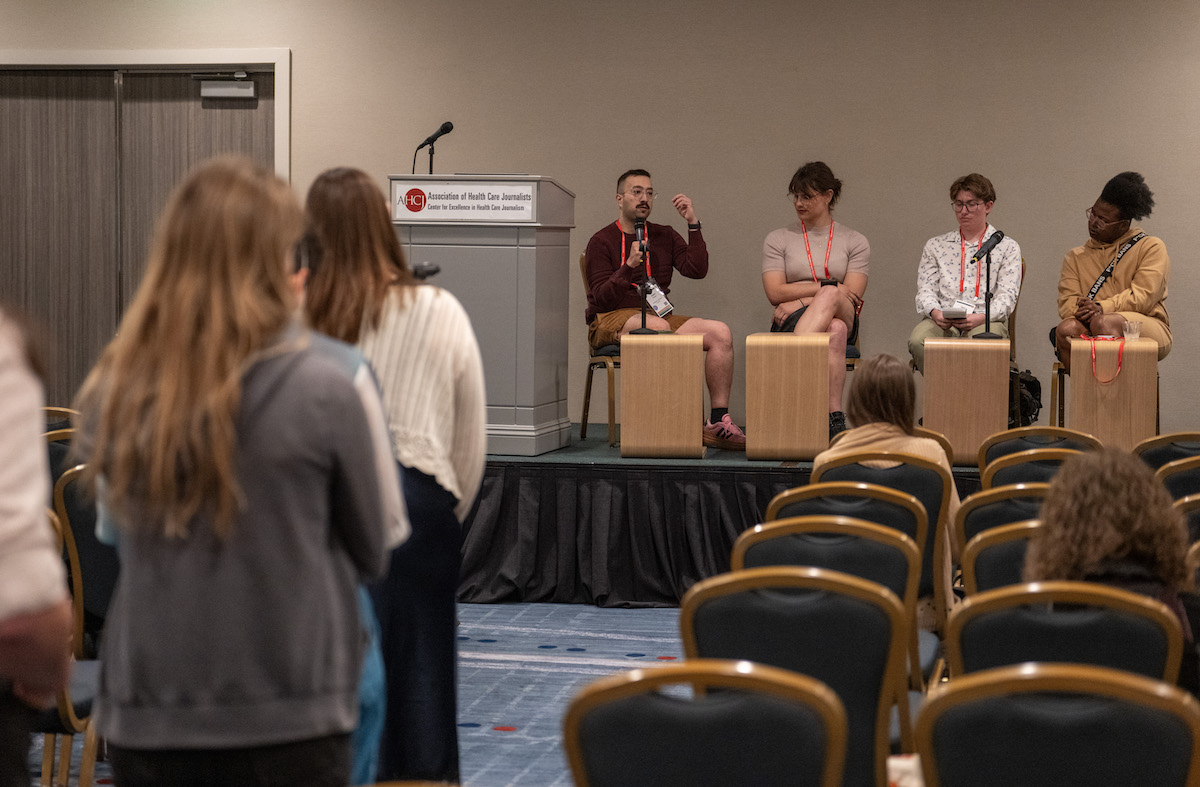Panelists of the HJ25 session “Beyond bans: Barriers to health care access for transgender people” answer questions. From left to right: Adam Rhodes, Rose Broderick, Henry Carnell and Tre’vell Anderson. Photo by Zachary Linhares
Beyond bans: Barriers to health care access for transgender people
By Nicole Ortiz, New York Health Journalism Fellow
The science behind the necessity of gender-affirming care has already been established, but that hasn’t stopped states from instituting bans on providing care for youths.
It’s an area of health care rife with barriers, from misinformation released at the federal level to the intersectionality overlap of identifiers such as economic status, race, immigration status and neurodivergence.
All members of the “Beyond bans: Barriers to health care access for transgender people” panel at Health Journalism 2025 pointed to the Trump administration’s new “Big Beautiful Bill” and a recently released Department of Health and Human Services (HHS) gender dysphoria report as examples of where mainstream reporting has fallen short.
“We’re seeing journalists just blindly repeating things without fact-checking,” Tre’vell Anderson, co-executive director of the Trans Journalists Association, said during the May 31 panel. “The reality is, there are these very clear, explicit political intentions behind all of this.”
For instance, Henry Carnell, digital/climate fellow at Mother Jones, pointed out that the HHS report was published after only three months of research without any authors named.
“It is, frankly, a little bit embarrassing that people are reporting uncritically on that sort of report,” he said.
When covering transgender care, he continued, context is often missing and reporting isn’t handled the way it would be for other stories not relating to gender-affirming care.
“There’s so much reporting about the evidence quality of trans health care,” he said, “but the proper context is that it’s really no different than the evidence quality of a lot of other health treatments out there, especially treatments used on youth.”
Further, Anderson noted, “all kinds of care are gender-affirming,” including IUD insertions and gynecomastia surgery.
And while these bans are currently focused on gender-affirming care for youths, they are a “mere stepping stone” for attacks against transgender adults, Adam Rhodes, training director at Investigative Reporters and Editors, said. For example, according to The Human Rights Campaign, several states don’t allow public funds to be used for transgender health care — cutting off critical services for trans public sector employees, those on Medicaid and people who are incarcerated.
Beyond federal limitations, it’s not exactly easy for trans people to go to the doctor — even for trans people with insurance that covers gender-affirming care. The risks range from a provider potentially putting a patient in danger by outing them after using their legal name instead of their preferred name to chalking up any and all medical issues to being related to a patient’s hormone replacement therapy.
Trans patients also often have lower incomes, and a patient in the midst of medically transitioning typically has a great deal of doctor appointments and pricey blood tests, Rose Broderick, a Disability in Health Care Reporting Fellow at STAT, said. There are also procedures that aren’t covered, such as laser hair removal treatments, where costs can add up over time.
Within the trans community, people can experience further marginalization, such as being neurodivergent or an ethnic or racial minority, she added.
“We can do a better job of exploring the intersections of trans identities with other types of identities because, lord knows, there are a lot of things happening to different populations in this country right now,” Broderick said.
Nicole Ortiz is the health care editor at Morning Brew based in New York’s Hudson Valley.
